Electronic Gluttony: A pig roast by any measure
Published by nika on Wednesday, January 03, 2007 at 10:01 AM.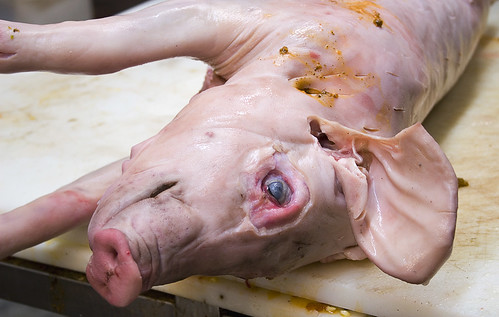
As a judge for the 2006 Food Blog Awards I had to to look at and evaluate a HUGE number of food blogs.
I read so much filling prose, I saw so much beautiful photography.
I came very near to catastrophy.
Around 11:30 or so last night, after debating various nominations ALL DAY LONG with other judges, I very nearly didnt want to ever blog or surf blogs again!
I know, its shocking, but true.
I must be ok because here I am today adding even MORE content to the huge food blogosphere (for better or worse). I have learned a lot and gained so much perspective from the exposure to so many different blogs. (Even if it did leave me quivering with hyper-exposure overstimulation syndrome, something I will call HOS for short).
I found the perfect visual personification of my experience over at Grab Your Fork's blog in today's post "Cafe Mix, Sydney".
Visit, but for the love of all that is good and holy, be sure to be hungry before you go!
In the spirit of stretch-mark inducing cuisine, I will share a sparsely worded pictorial of what it takes to prepare a pig for a latino pig roast (traditional at Christmas and New Years).
Be warned, we ARE talking about carnage and reality here. If you are a vegetarian or of a delicate constitution you may not wish to scroll further down.
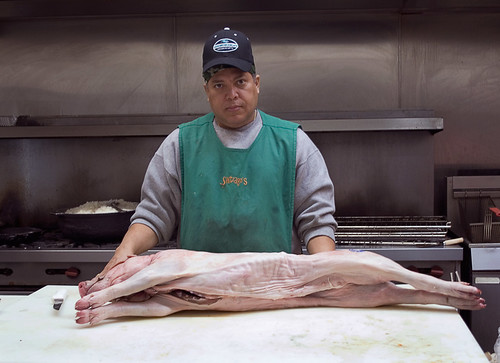
This fellow was so patient. This look tells the story. He is wondering why in god's name would a self-respecting woman with pre-teen daughter in-tow want to spend time in the bowels of a large latino supermarket, in a less-than-spotless prep kitchen, shooting pictures of a perfectly boring and routine activity like getting the pig ready to roast. On top of all that, my spanish is so bad (was my first language but it has suffered massive attrition over the years of living in gringo-landia) that it was hard to explain to him why I would want to take these pictures. As a result, I am now putting together a photobook on latino foods (really, honestly, look at my eyes, would I lie?).
Let us commence with the gore and oddly intimate aspects of pig roast making.
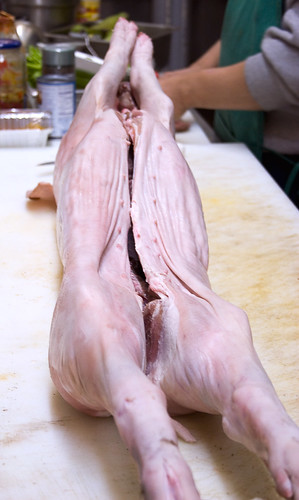
This was a young pig, not suckling nor fully mature. Perhaps something like a junior in high school, still somewhat tender but with some meat on the bones.

I watched and was forced to deduce the purpose of things by observation, not interrogation. Maybe its better this way.
Here the chef is using a meat cleaver to crush the vertebrae of the spinal column. Why oh lord why, do you ask? This is the first step in getting the carcass to lie flat so that it roasts evenly.

He then pulled open the chest cavity and pulled down the rib cage, breaking it along the spine so that it would lay open.
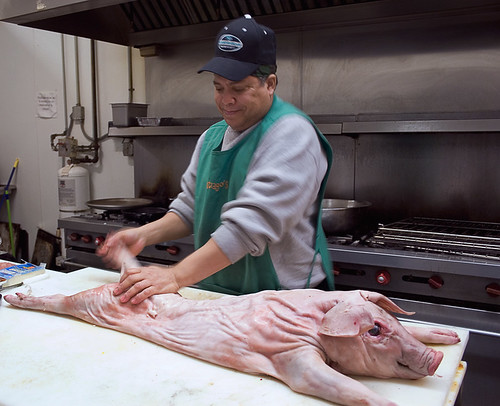
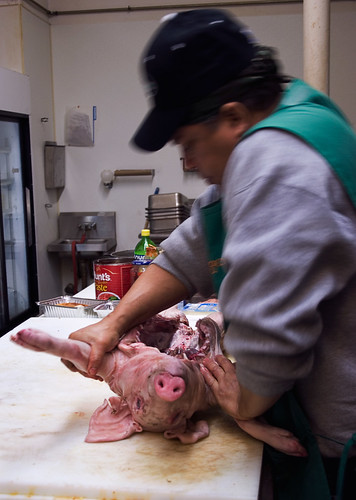
Another thing that has to be done to get this carcass to lie flat is to break the joints. This is the intimate odd part I mentioned. It is really reminiscent of a massage (a harsh one to be sure) and the chef was really quite meditative about the whole thing. He must have done MANY of these. I think 10 pigs for this New Years alone.
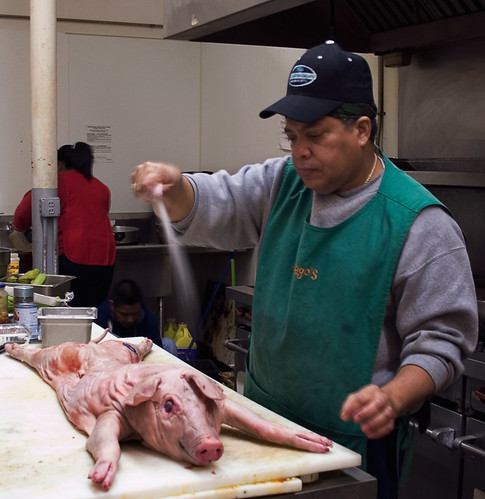
The chef sprinkled salt all over, inside and out. He also rubbed it into the skin and meat.

After the salt came the lemon juice. He sloshed the juice everywhere, very liberally.
The pig sat after this treatment for about 15 minutes or so while the chef got the marinade going. This involved garlic, whole oregano, and mystery spices (or ones I just did not recognize in spanish - see, mysteries).

After those 15 minutes, the chef hauled the carcass over to the freshly scrubbed sink and he washed off the salt and juice.
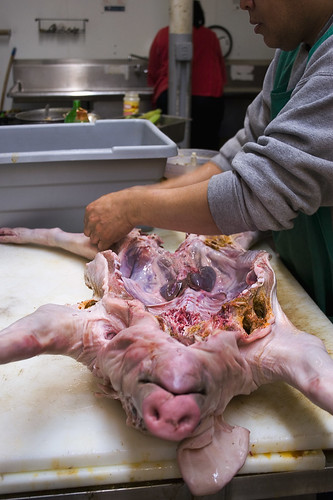
What I didnt show earlier is the poorly shot and rather disturbing images of the chef gouging holes into the skin and meat. The skin so that it renders into crisp goodness, the meat so that it can accept the rub/marinade. The chef is methodically rubbing in the marinade, pushing it into pockets he made with a knife and all over the surface.

After the whole carcass is covered in rub it goes into the walk-in cooler over night. The chef said that he would rub coconut water onto the skin before roasting for 4 hours. The coconut water gives the skin a slightly sweet flavor and I think helps with the crisping and carmelizing process.
He said that this would cost something like $60 and feed some 50 people (ok, maybe 10 of my relatives).
Hope you enjoyed this.
I am planning to do more of these in the future. One showing the making of salchichas (colombian sausages) (also see these pics) either by a butcher or myself (have to get a meat grinder 1st though). I also promise better pictures because today I will be taking delivery of a new flash bracket and 580ex flash for just these purposes!
Related Posts:
- How-2 guide on how to make Platanos (fried plantains or tostones)
- Yucas Fritas (Fried Yucas or Cassava Root) Recipe and How 2 photos
- Empanadas - The Recipe
- Flash Flickr Movie of How to make Colombian Empanadas
- Chicharron - Deep fried pork belly - How To
- How to make Colombian Empanadas - directions
- Latest full recipe for Colombian Bunuelos (2006 post)
- Last year's Christmas Bunuelo Decadence
- A Colombian breakfast How-2 guide
- Colombian Frescos
- Lechona preparation

Links to this post